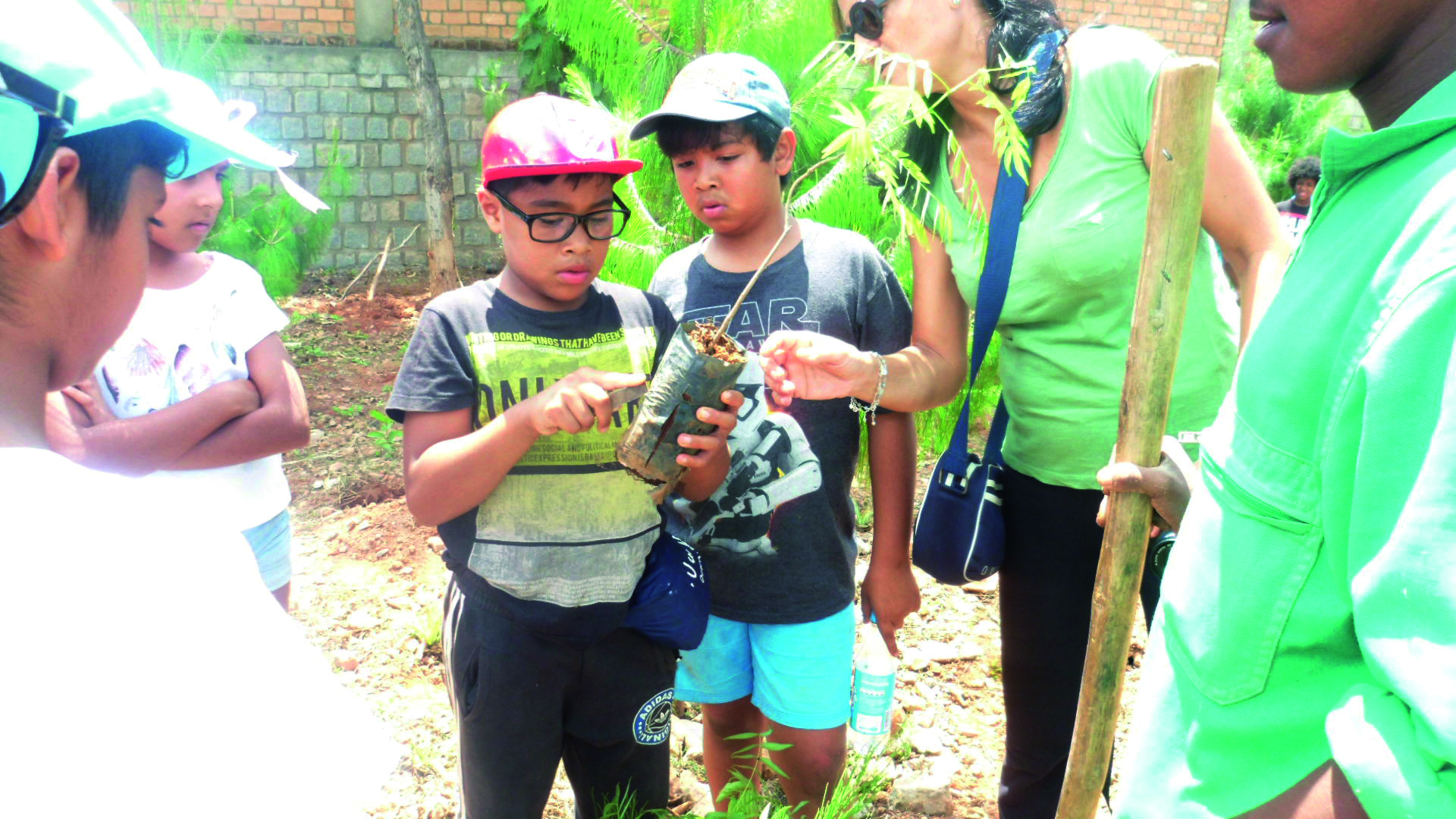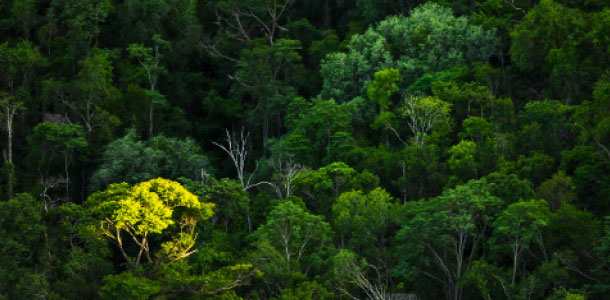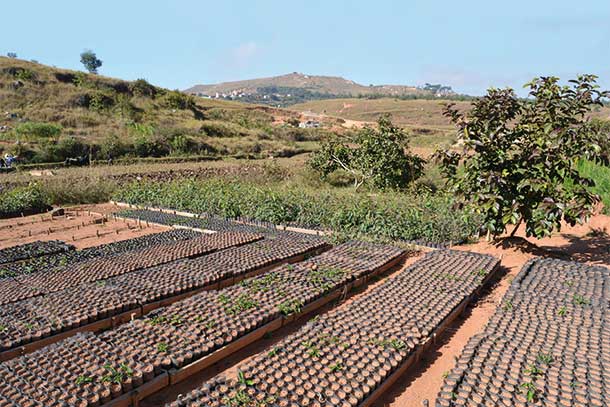Actions on our negative externalities
- Commitment #6 -

Focus 2022
Protecting life in Madagascar
After the passage of cyclone Emnati, which recorded average winds of 100 km/h and gusts of 140 km/h, the island of Madagascar is experiencing a difficult climatic, humanitarian and environmental crisis.
More than ever, on this territory, the cradle of thousands of species, protecting life is a major challenge and a question of survival for humanity. This global biodiversity hotspot is home to over 250,000 species, 70% of which are endemic, including lemurs, birds, chameleons and frogs. It also has a unique fauna and flora for thousands of years. Established on the territory through its production workshop EPSILON/ CEPOVETT, has given itself the mission to regenerate the living world by multiplying the actions of reforestation, protection of ecosystems and support of the Malagasy populations (tree plantations, involvement of the employees and awareness raising with local partners). Solidarity with Madagascar so that the island can preserve its diversity and wealth and continue to offer people and species a fertile and protective land.

Focus 2021
Madagascar: from the red island to the green island
With 44% of its natural forests lost in 60 years and 150,000 hectares disappearing every year, Madagascar represents one of the most alarming cases of deforestation in the tropical world.
To remedy this, the Malagasy government has set itself the goal of replanting 60 million trees per year (including acacias, eucalyptus, fruit trees, clove trees and vanilla trees), reforesting 400 km2 of the country's surface. Mainly due to slash-and-burn agriculture (rainfed rice, corn, peanuts), deforestation on the fifth largest island in the world is endangering endemic species, almost all of which live in the Malagasy forests. The awareness of national authorities is all the more commendable since reforestation is the most effective natural method in the fight against global warming, as the oceans and forests are the main carbon sinks on earth. Thanks to this reforestation policy, the red island (in reference to the laterite that colors its plateaus) of Madagascar could become a green island in a few years.

Focus 2020
Reforestation, climate and biodiversity, same fight
The United Nations' MDGs 13 and 15 address the fight against global warming and the preservation of terrestrial ecosystems, to which reforestation contributes. Objective: to reverse the process of soil degradation, to put an end to the disappearance of biodiversity linked to rampant deforestation. Forests cover 30% of the planet's surface, ensure food security and provide shelter. They are essential to fight against climate change, the increase in global temperature and protect biodiversity. By restoring the forests, we contribute to sequestering the carbon emitted by our activities and to protecting the living, both plant and animal. For the past 5 years, CEPOVETT Epsilon has been involved in an ambitious reforestation program near its industrial site in Madagascar, which combines education of future generations and customer awareness of the protection of fauna and flora.
Focus 2019
Children plant 16,000 trees in Madagascar
The reforestation training operation "one tree, one child "was launched in 2018 with Epsilon teams and the participation of children from the Akamasoa association created by Father Pedro. The first stage of this program was based on technical support for tree planting and maintenance by Epsilon's teams, as well as awareness of local biodiversity issues. In February 2018, 900 students from Akamasoa planted 1500 seedlings consisting of eucalyptus and pine trees. In a second stage, the children planted 15774 plants, in complete autonomy. The reforestation is carried out every Friday afternoon by students from among the 1430, in total, that the association has. This operation will be extended each year thanks to the nursery-raised plants provided by Epsilon, which contributes to this initiative for future generations.
Focus 2018
A reforestation program connected to the activities
Pursuing the ambitious 2°C objective defined by the international climate conference (COP21), CEPOVETT Group contributes through its voluntary carbon offsetting program in the geographical areas impacted by its activities in Europe, Africa and Madagascar. This reforestation program began in Africa in 2011, in connection with cotton cooperatives in Mali, and then extended to one of its garment sites in Madagascar. In 2017 the mobilization of employees and the assistance of stakeholders made it possible to plant more than 10,000 trees in Madagascar, in particular endemic fruit varieties (avocado trees, bibassus trees, mango trees, lychee trees, guava trees...) with the plants being raised in nurseries installed on the Epsilon industrial site. This socio-economic and environmental reforestation program aims not only to respond to environmental issues by sequestering carbon, but also economically by providing an additional source of income to local populations in a logic of solidarity. Today, a real conservatory garden of nearly 200 species is being built on the site, mainly for the multiplication of varieties needed for nursery production.
Focus 2017
2017 Report
Pursuing the ambitious 2°C objective set by the international climate conference (COP21), CEPOVETT Group contributes through its voluntary carbon offsetting program in the geographical areas impacted by its activities in Europe, Africa and Madagascar. In 2016 thanks to the mobilization of its employees and the support of its customers, CEPOVETT Group planted 10,000 trees in Madagascar, including endemic fruit varieties (avocado trees, bibassiers, mango trees, lechee, guava trees...) the plants being raised in nurseries installed on the industrial site. This socio-economic and environmental reforestation program aims not only to respond to environmental issues by sequestering carbon, but also economically by providing an additional source of income to local populations in a logic of solidarity. Today, a real conservatory orchard of nearly 200 species is being built on the Epsilon site, mainly for the multiplication of varieties needed for nursery production. The young plants are irrigated exclusively by the plant's phytological purification station.
Focus 2016
2016 Report
A real success in 2015, the International Climate Conference (COP21) ended with the adoption of an ambitious agreement: keeping global warming below 2ºC. This objective cannot be achieved without the mobilization of all actors. The CEPOVETT Group has contributed through its voluntary carbon offsetting program in geographical areas impacted by its activities in Europe, Africa and Madagascar. The year 2015 was marked by the ramping up of the "Tree of Life, Solidarity Cotton" program in Madagascar, where 10,000 new trees were planted. Based on the success of its experimental reforestation program in Mali, EPSILON-CEPOVETT Group has focused on the reforestation of fruit varieties on the island of Madagascar, in particular mango, litchi and other citrus trees, which will subsequently provide additional income to local populations.
